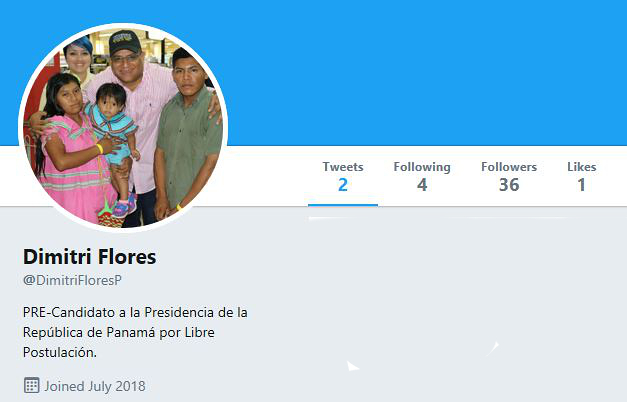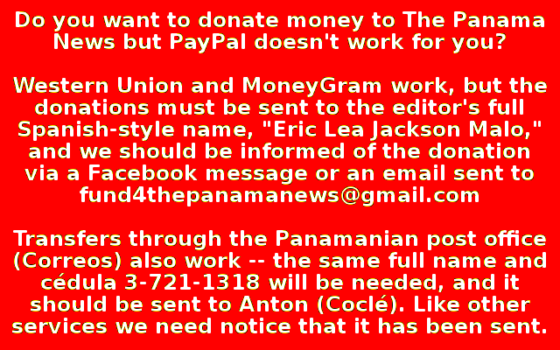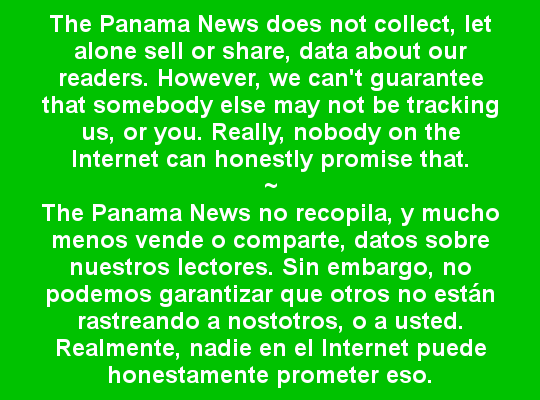
The independent candidates: the
real, the fake and the excluded
by Eric Jackson
In late November, the Electoral Tribunal was by its own records caught publishing false totals about who had submitted the most petition signatures to get on the ballot as an independent presidential candidate. The magistrates who represent the political partigGes had listed legislator and former attorney general Ana Matilde Gómez in first place, the secretive Dimitri Flores in second and former legislator and Bonlac dairy scion Marco Ameglio in third. But actually third place was held by attorney and Christian anti-corruption activist Roberto Lombana. A week or so later, after a hue and cry, the tribunal corrected the figures and pleaded insufficient staff for the false press release.
The tribunal has decreed that only three independents make it to the ballot, no matter if more than that number get the required number of signatures. That leaves law professor, media personality and human rights activist Miguel Antonio Bernal off the ballot if things stay in the order stated. In a curious ruling based on an interpretation of a prior election law, the Supreme Court held that the constitutionality of the three independents only rule was “res judicata,” that is, already decided. No matter that the earlier ruling wasn’t even about the constitutionality of that provision. (Perhaps in a Common Law jurisdiction the earlier decision might be considered persuasive or controlling precedent, but Panama’s legal system is part of the Civil Code family that descends from Roman law via the Napoleonic Code, in which precedent is far less persuasive than by the history-oriented systems that derive from English law.)
Lombana? He’s an actual independent and, although he’s an Evangelical, lacks the ties to the pastors and churches behind the Alianza party or who were part of Ricardo Martinelli’s political operations past or present. Beware of applying US political standards and stereotypes to Evangelicals here. Sometimes it matches, including with US-inspired anti-gay activism by many born-agains here. But corruption has been a divisive issue among Evangelicals here, especially controversies revolving around the Templo Hosanna mega-church. Unlike that institution’s Reverend Álvarez and San Miguelito’s mayor Reverend Cumberbatch, Lombana is unencumbered by such baggage and is possessed of apparently valid anti-corruption credentials. But Lombana has never held public office, something that might be twisted into a pitch to the voters but would likely make him a highly dependent president if ever he gets to the Palacio de las Garzas.
Ameglio? He’s one of these wandering politicians who would make public office part of the family business, who wandered from the Solidaridad party and its aftermath, then in and out of the Panameñista Party long enough to be its leader and then to be ousted as such by Juan Carlos Varela. That party worships its late founder Arnulfo Arias but notoriously treats former leaders badly. The conventional wisdom is that Ameglio on the ballot would peel off votes from the Panameñista and Cambio Democratico parties. The man has to date issued no compelling reason beyond belief in himself for voters to trust him. If there is to be a general backlash against incumbent legislators, will that apply to former legislators as well?
The Electoral Tribunal is not allowing opinion polls this year — something perhaps justified by 2014’s inaccurate polls, but also something very convenient if there is fraudulent intent. Were there to be decent surveys made public, it is this writer’s estimate that they would terminally deflate any pretensions of one Dimitri Flores. He says that he’s a businessman, of which businesses he won’t say. He won’t even provide a brief biography to press and public. His campaign donors? He says that it’s all self-financed. His dodges about those things in a July interview with La Estrella’s Adelita Coriat are infamous:
Coriat: Why do you brag that you do not collect money from your sympathizers? What makes you so different from others who have money?
Flores: It’s not that one has money, it’s that one has to work.
Coriat: We all work, but we may not have the same income.
Flores: So why do they get into this?
Coriat: Do you think that the one with money becomes president?
Flores: … One who does not show that in his life he has been able to succeed, and that he has been able to save $ 100 thousand in its 40 or 50 years — hello? What message are you giving me about succeeding in what you did in your own life? What are you going to do with us?
Coriat: But how do you measure personal success? In money?
Flores: That’s how you have to prove it.
Coriat: Show it how? In money or in what?
Flores: Where are you? Did you get over it?
Coriat: I do not have money, I can’t run for president?
Flores: Has a 45-year-old person in this country not been able to save even $100,000?
Thus spake a man with no visible means of support, no record of any sort of activism in politics or other spheres of public life, no stand on any of the issues that affect this country, no discernible campaign team or base of support — just these nearly 80,000 signatures that he has submitted to the Electoral Tribunal. Flores is a placeholder, a creature of someone else, of another political force, fleetingly in public life to keep some other independent off of the ballot. It’s a corrupt position created by the political parties, via the Electoral Tribunal which represents them.
Finally, there is the current leader among independents, by numbers of signatures submitted to the Electoral Tribunal and surely, were such things allowed, at or near the top in any public opinion poll, Ana Matilde Gómez, the legislator and former attorney general (“Procuradora General,” as it is styled here in the Spanish original). The Gómez team has been out in public places gathering signatures. The refuse to be photographed doing so. Her donors and backers are in general undisclosed, in some cases denied. The popular belief is that it’s the money of Stanley Motta and a few of his wealthy but less wealthy friends, and the Independent Movment (MOVIN) that he created ahead of the 2014 campaign. Along the way, during her career as an attorney she did work for the Mottas’ bank even if she tells people that this is of no political significance. (She also worked for the US government in the post-invasion period and surely some will mention and interpret that along the campaign trail.)
Gómez has a record in public life. It might be expected that some will focus on the cases as attorney general (David Murcia Guzmán, Odebrecht) and as member of the legislature’s Credentials Committee (most complaints against Supreme Court members) that she did not touch. The actions that she did take against the looting of the Ministry of Education during the Torrijos administration and against hoodlum magistrate Alejandro Moncada Luna as a legislator will probably get more attention. The question will be whether she would err on the side of attacking corruption, or on the side of maintaining an inevitably corrupt and long-running non-aggression pact among political parties and branches of government. That, and which privileges the Motta family might derive or maintain by virtue of her presidency.
So is everything carefully engineered, from the propping up of Ricardo Martinelli’s Cambio Democratico party (including by maintaining candidate immunity for its presidential nominee Rómulo Roux) to manipulation of independent candidacies blocked or allowed through arbitrary rules or their non-application? Remember that this was the norm in Noriega times and not only did its chief practitioner not go to prison after the invasion, she became a law school dean.
It LOOKS LIKE the 2019 presidential choice Panamanians are about to be given is between two leading candidates in an eight-way race, the PRD’s Nito Cortizo and Motta-backed independent Ana Matilde Gómez. Perhaps somebody can break out of the pack
Will such foreign powers that have intervened in Panamanian elections in the past, the United States and Brazil, do so again? Is somebody in some fashion angling for Chinese participation, and would China deviate from its usual correct diplomatic aloofness from other countries’ internal affairs and swallow that bait? Figure that the allegations that someone is someone else’s agent will generally fall short of reality.
There will be a window of opportunity for alliances. The Partido Popular, successor to the center-right Christian Democrats, supports the Panameñistas and José Blandón. MOLIRENA will probably support the PRD. Alianza might go somewhere or just stay as is — they are nothing if not opportunists and their natural ally, Cambio Democratico, is likely to be crushed into minor party status.
Parties may not form alliances that put independents who remain independents on their tickets, but they may offer an independent who drops such a bid a candidacy under the party banner in exchange. Independents might take on another independent as a running mate.
Getting down to the independents seeking lesser offices, the same three candidates only rule is being applied, the Electoral Tribunal is throwing people off the ballot over bogus residency allegations and all sorts of the usual suspects are running as independents because the parties are so discredited. Perhaps the most prominent among the new “independents” is Evangelical pastor and Cambio Democratico mayor of San Miguelito, Gerald Cumberbatch.
~ ~ ~
These announcements are interactive. Click on them for more information.












